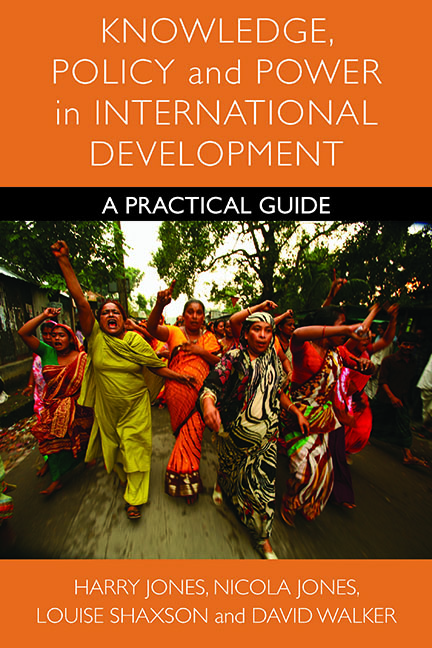Book contents
- Frontmatter
- Contents
- List of tables and figures
- List of acronyms
- Glossary
- Acknowledgements
- one Navigating the Knowledge–Policy Landscape
- two Mapping political context
- three Engaging actors
- four Integrating different types of knowledge
- five Facilitating knowledge interaction
- six Conclusion and policy implications
- References
- Index
three - Engaging actors
Published online by Cambridge University Press: 01 September 2022
- Frontmatter
- Contents
- List of tables and figures
- List of acronyms
- Glossary
- Acknowledgements
- one Navigating the Knowledge–Policy Landscape
- two Mapping political context
- three Engaging actors
- four Integrating different types of knowledge
- five Facilitating knowledge interaction
- six Conclusion and policy implications
- References
- Index
Summary
The growing literature on the links between knowledge, policy and power reflects a diversity of approaches to understanding the role of different actors. Having shown how political context affects the relationships between knowledge and policy, this chapter delves deeper to outline the relationships between people (as individuals or in organisations) and their knowledge. It looks at the various factors influencing how different actors seek out, filter, interpret and ultimately use knowledge in policy and the implications this has for how they engage with the policymaking process. Its purpose is to help readers develop a strategy to analyse and engage with the wide variety of actors who operate at the knowledge–policy interface.
By the end of this chapter, readers will be able to answer the following questions:
• What shapes how different actors behave at the knowledge–policy interface?
» Do actors always act in their own self-interest, or are there other issues to
consider?
» What role do values and beliefs play in how knowledge is used in policy?
» Different actors have different degrees of credibility when it comes to knowledge for policy – what influences this, and what influence does this have?
• What effects do these factors have on the openness and transparency with which different actors share knowledge?
• What are the implications for less powerful or more fragmented voices?
This chapter first synthesises prevailing conceptions of actors’ behaviour in the policy arena, then develops a simple tripartite framework that distinguishes between actors’ interests, their values and beliefs, and their credibility. Examining the roots of each of the three dimensions enables us to analyse the implications for how knowledge is used in policy, and to develop practical pointers to strengthen the quality of interaction between different actors at the knowledge–policy interface.
Understanding different actors’ behaviour at the knowledge– policy interface
Early work on the knowledge–policy interface drew on a ‘knowledge-driven’ model of the policy process and considered the role of relatively few actors (Neilson, 2001a). Empirical and theoretical work viewed policymakers as ‘problem solvers’, drawing on knowledge to guide and improve policy. While Weiss (1979) took a more nuanced view of research–policy links with her notion of enlightenment, in practice bureaucrats and staff in executive agencies were generally cast as neutral facilitators of evidence-based policymaking, working through applied reason and logic irrespective of influence from political context, intermediary knowledge brokers or the type of knowledge being used.
- Type
- Chapter
- Information
- Knowledge, Policy and Power in International DevelopmentA Practical Guide, pp. 47 - 80Publisher: Bristol University PressPrint publication year: 2012

